|
|
|
Sort Order |
|
|
|
Items / Page
|
|
|
|
|
|
|
| Srl | Item |
| 1 |
ID:
142286
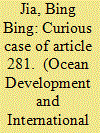

|
|
|
|
|
| Summary/Abstract |
This article discusses the issue of treaty regimes in parallel to the United Nations Convention on the Law of the Sea in respect of peaceful settlement of disputes concerning the interpretation or application of the Convention. The duality in relevancy of such disputes to two treaties at the same time would have begged the question about which treaty should be applied to settle them, but UNCLOS has a clear, conflict-of-law style rules in place to address the question. Article 281(1) is one such rule, and, with its exclusionary effect, stands out as a super provision of the Convention.
|
|
|
|
|
|
|
|
|
|
|
|
|
|
|
|
| 2 |
ID:
110908
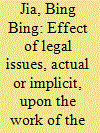

|
|
|
|
|
| Publication |
2012.
|
| Summary/Abstract |
The mandate and working procedure of the Commission on the Outer Limits of the Continental Shelf (CLCS) are defined primarily by Article 76(8) and Annex II of the United Nations Convention on the Law of the Sea (UNCLOS). The nature of the work of this body is a mixture of technological, scientific and legal elements. The question arises in practice as to what legal effect, if any, the CLCS's recommendations will have on points of law that concern the interpretation and application of the UNCLOS. Article 76(8) and other instruments related to the CLCS's work leave certain issues undefined, such that disputes between States in the delineation of the outer limits of a continental shelf may result in limits which lack both finality and binding force. It is suggested that to avoid that situation, general acceptance by other States concerned is necessary, and that the CLCS may consider referring a legally disputed point for another competent body to determine, before it proceeds with the making of recommendations.
|
|
|
|
|
|
|
|
|
|
|
|
|
|
|
|
| 3 |
ID:
121480
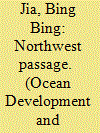

|
|
|
|
|
| Publication |
2013.
|
| Summary/Abstract |
This article uses the Northwest Passage as a case for study of one issue relating to the regime of international straits: whether a strait formed geographically and functionally by means of artificial aids for navigation may be regarded as an artificial waterway to which the regime of international straits does not apply. The article suggests that the Northwest Passage could be subject to a bilateral treaty regime between Canada and the United States, largely akin to that which applies to artificial waterways such as the Panama Canal. This solution would guarantee both Canadian sovereignty over the Passage and the interests of international shipping in having a route open and secure.
|
|
|
|
|
|
|
|
|
|
|
|
|
|
|
|
| 4 |
ID:
120611
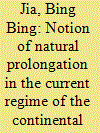

|
|
|
|
|
| Publication |
2013.
|
| Summary/Abstract |
The juridical continental shelf (CS), in terms of Article 76(1) of the United Nations Convention on the Law of the Sea (the LOS Convention), relies for its existence on the presence of a continental margin, which in turn depends on the existence of a natural prolongation. This is the principle expounded by this article, in the light of the provisions of Article 76(1) and (3) of the LOS Convention and other types of evidence of State practice. The prolongation, being geological in nature, is a necessary element underlying any claim to a juridical CS. Thus, in litigations, evidence must be led of its existence in support of such a claim. Even if the degree of influence exerted by the doctrine of natural prolongation upon the entitlement to the juridical CS and the delimitation of that entitlement between opposite or adjacent States are yet to be made clear in practice, the doctrine still has a separate life, of increasing importance, in today's legal regime of the CS. This is said in spite of the International Court of Justice (ICJ) judgment in Libya/Malta that emphasizes the distance criterion in respect of the continental shelf within 200 nm. The International Tribunal for the Law of the Sea (ITLOS) judgment in the recent Bangladesh/Myanmar delimitation case has provided an interesting interpretation of the notion of natural prolongation, and implicitly confirmed the relevance of the notion to the entitlement to the continental shelf in question. The case law in this regard has been significant, but other categories of State practice are also evolving that may underlie a new trend of giving the notion of natural prolongation a renewed, prominent place in this field.
|
|
|
|
|
|
|
|
|
|
|
|
|
|
|
|
| 5 |
ID:
134950


|
|
|
|
|
| Summary/Abstract |
The current standoff over Huangyan Island (Scarborough Reef/Shoal) between China and the Philippines is one that above all concerns the sovereignty over the island. The Philippines made its position known in 1997 that it relies on effective occupation of the island as the basis for its claim. This article, a preliminary study, seeks to demonstrate that there are not two competing titles respecting Huangyan Island's ownership, but only one, i.e., China's. Even in terms of the doctrine of effective occupation, China has a superior claim to the title to the island.
|
|
|
|
|
|
|
|
|
|
|
|
|
|
|
|
| 6 |
ID:
182586


|
|
|
|
|
| Summary/Abstract |
This case, involving the Kerch Strait and the Sea of Azov, was initiated by Ukraine against Russia under Annex VII, UNCLOS, on 1 April 2019. Having cleared the stage of provisional measures before the ITLOS, it is pending before an arbitral tribunal established under Annex VII. After the ITLOS proceedings, there is room either to broaden the scope of jurisdiction for the tribunal or to narrow it. The question of jurisdiction to be considered here reflects wider issues common to other arbitral proceedings under Annex VII. Two propositions will therefore be considered. The first is that, as the dispute may lie in the source of the supposed right for the Ukrainian warships to pass through the strait, the 2003 Cooperation Agreement may displace the UNCLOS, divesting the tribunal of jurisdiction. The second proposition is that, if the incident of 25 November 2018 involves, solely or primarily, a dispute concerning the interpretation or application of the UNCLOS, the provisions should include those of Articles 19, 25 (1), 30, 45, and 311, which provide other causes of action.
|
|
|
|
|
|
|
|
|
|
|
|
|
|
|
|
| 7 |
ID:
094110
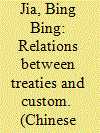

|
|
|
|
|
| Publication |
2010.
|
| Summary/Abstract |
The interplay between treaty and custom is a topic of great importance in practice and theory. An attempt at unravelling the intrigues involved in this interplay requires an understanding of the formal nature of the two sources of treaty and custom, and of the impact they exert upon each other in the search for applicable law in a concrete situation by government officials, judges and legislators. The separateness of these two sources is at times blurred, but shall always be maintained. Rules derived from both sources contribute to the body of international law, and they are rules of equal force. The rules thus derived may restrict each other in application and conflict in content, thus being conducive to incongruity in law, and may become asymmetrically opposed, as practice often outpaces or ignores treaty in response to evolving realities.
|
|
|
|
|
|
|
|
|
|
|
|
|
|
|
|
|
|
|
|
|